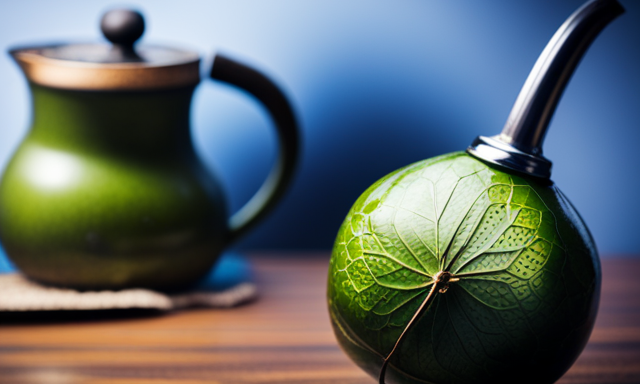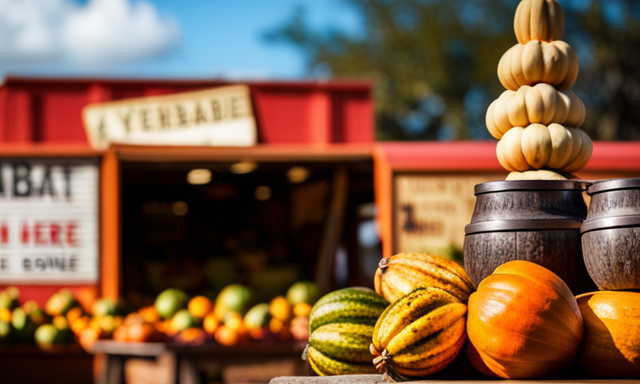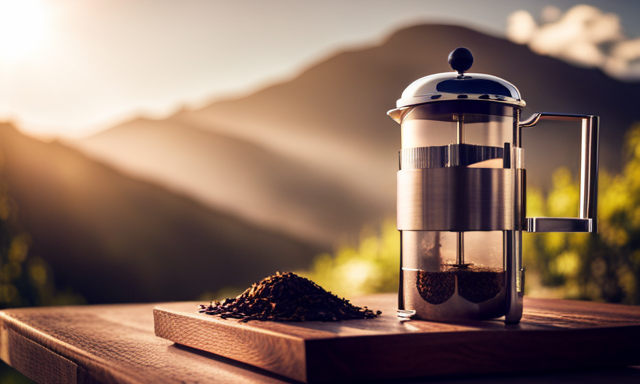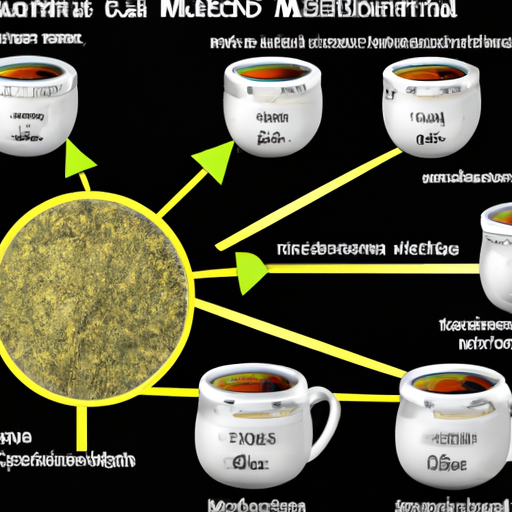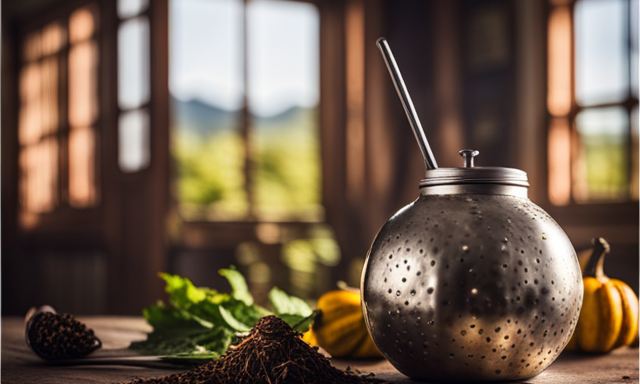Wow, grab your cups, everyone, as we’re gearing up to explore the energizing realm of yerba mate! Just like me, if you need that burst of energy to kickstart your day, yerba mate is exactly what you’re looking for.
This South American beverage has been praised for its invigorating effects and unique flavor. But just how much caffeine does yerba mate actually have? That’s the question we’re here to answer.
In this article, we’ll explore the origins and cultural significance of yerba mate, understand the effects of caffeine on our bodies, and compare yerba mate to other caffeinated beverages. We’ll also delve into the factors that affect the caffeine content in yerba mate and discuss the benefits and potential side effects of consuming this beloved drink.
So grab your gourds and get ready to sip on some knowledge, because we’re about to uncover the caffeine secrets of yerba mate!
Key Takeaways
- Yerba mate has high caffeine content, comparable to coffee.
- Some brands may have higher caffeine levels, so check labels.
- Excessive caffeine can lead to increased heart rate, anxiety, and difficulty sleeping.
- Limit daily yerba mate intake to 2-3 cups to avoid side effects.
What is Yerba Mate?
Yerba Mate is a fantastic alternative to coffee, packed with energy-boosting caffeine and a unique flavor profile. This traditional South American drink is made from the leaves of the yerba mate plant and is known for its invigorating effects.
Yerba mate can be prepared using different methods, such as using a gourd and bombilla or using a French press. Each preparation method brings out different flavors and variations in the drink. Some popular flavors include traditional, which has a strong and bitter taste, and fruity variations, which add a hint of sweetness. Exploring these different flavors and preparation methods can be a fun and exciting way to experience yerba mate.
Now, let’s delve into the origins and cultural significance of yerba mate.
The Origins and Cultural Significance of Yerba Mate
Originating in South America, this beloved beverage has deep cultural roots and holds a significant place in the traditions of its native people.
Yerba mate, known for its unique taste and energizing properties, has a rich history that dates back centuries. To understand the origins and cultural significance of yerba mate, consider the following:
-
Indigenous Origins: Yerba mate was first consumed by the indigenous Guarani people, who believed it had medicinal and spiritual properties. They passed down their knowledge of preparing and drinking mate from generation to generation.
-
Social Rituals: Sharing mate is a common social ritual in South America. It brings people together, symbolizing friendship and hospitality. The act of passing the mate gourd and drinking from the same straw, known as a bombilla, fosters a sense of unity and connection.
-
Cultural Identity: Yerba mate is deeply ingrained in the cultural identity of countries like Argentina, Uruguay, and Paraguay. It is often associated with gauchos (South American cowboys) and is considered a national drink in these countries.
Understanding the origins and cultural traditions surrounding yerba mate helps us appreciate its significance as we delve into understanding caffeine and its effects on the body.
Understanding Caffeine and its Effects on the Body
Caffeine, a stimulant found in many popular beverages, such as coffee and tea, can have a variety of effects on the body. It acts as a central nervous system stimulant, increasing alertness and reducing fatigue. However, it is important to understand the recommended caffeine consumption guidelines to avoid potential negative effects. According to the FDA, a moderate intake of caffeine, which is about 300-400 mg per day, is generally considered safe for most healthy adults. Excessive consumption, on the other hand, can lead to symptoms like jitteriness, increased heart rate, and insomnia. Long-term effects of caffeine include dependence and withdrawal symptoms. It is crucial to be mindful of our caffeine intake and listen to our body’s signals. Now, let’s explore how yerba mate compares to other caffeinated beverages.
How Yerba Mate Compares to Other Caffeinated Beverages
Among the plethora of potent caffeinated beverages, yerba mate stands out as a stimulating sip that satisfies the senses. When comparing yerba mate to coffee, it’s important to note that yerba mate contains less caffeine than coffee. On average, an 8-ounce cup of yerba mate contains about 30-50 milligrams of caffeine, while an 8-ounce cup of coffee contains about 95 milligrams of caffeine. This makes yerba mate a milder option for those seeking a pick-me-up without the jitters or crash associated with higher caffeine levels.
Additionally, yerba mate also differs from energy drinks, which often contain high levels of caffeine and other stimulants. Yerba mate provides a more balanced and sustained energy boost without the excessive caffeine content. Understanding the differences between yerba mate, coffee, and energy drinks can help individuals make informed choices about their caffeine consumption.
Moving forward, let’s explore the factors that affect the caffeine content in yerba mate.
Factors Affecting the Caffeine Content in Yerba Mate
To understand what factors can affect the caffeine content in yerba mate, you might be surprised to learn that the way it’s prepared and brewed plays a significant role.
The factors influencing caffeine levels in yerba mate include the processing methods used. For example, the amount of time the leaves are dried and the temperature at which they’re processed can impact the caffeine content. Additionally, the ratio of leaves to water and the steeping time can also affect the caffeine levels in the final drink.
Studies have shown that longer steeping times and higher leaf to water ratios result in higher caffeine content. These factors highlight the importance of understanding the brewing process when considering the caffeine content in yerba mate.
Transitioning into the subsequent section, it’s important to note that the average caffeine content in yerba mate can vary depending on these factors.
The Average Caffeine Content in Yerba Mate
In the previous section, we discussed the various factors that can affect the caffeine content in yerba mate. Now, let’s talk about the average caffeine content you can expect in a cup of yerba mate.
On average, a cup of yerba mate contains about 30-50 milligrams of caffeine. This amount can vary depending on factors such as the brand, preparation method, and brewing time. To put this into perspective, a cup of coffee typically contains around 95 milligrams of caffeine, while a cup of black tea contains about 47 milligrams.
It’s important to note that caffeine can have different effects on individuals, and its impact on sleep can vary. Generally, it is recommended to limit caffeine intake to around 400 milligrams per day, as exceeding this amount may lead to sleep disturbances.
Now, let’s move on to the next section where we will explore the benefits of consuming yerba mate.
The Benefits of Consuming Yerba Mate
Drinking yerba mate can offer a stimulating and invigorating experience, providing a natural boost of energy and promoting mental clarity. This traditional South American beverage is known for its numerous health benefits.
Yerba mate contains a variety of vitamins, minerals, and antioxidants that support overall well-being. It has been found to boost the immune system, aid in digestion, and promote cardiovascular health.
Additionally, yerba mate has been shown to increase focus and concentration, making it a popular choice among students and professionals. The energy boost provided by yerba mate is often described as more balanced and sustainable compared to other caffeinated beverages. It contains caffeine, but also other natural compounds such as theobromine and theophylline that contribute to its effects.
As we explore the potential side effects of consuming yerba mate, it’s important to understand the benefits it can offer.
Potential Side Effects of Consuming Yerba Mate
One thing to keep in mind when enjoying yerba mate is the possibility of experiencing side effects. While yerba mate is generally considered safe when consumed in moderation, it’s important to be aware of the potential health risks associated with excessive consumption. One such risk is the high caffeine content of yerba mate. A typical serving of yerba mate contains about 30-50 milligrams of caffeine, which is comparable to a cup of coffee. However, some brands may have higher caffeine levels, so it’s important to check the labels. Consuming too much caffeine can lead to side effects such as increased heart rate, anxiety, and difficulty sleeping. It is recommended to limit your daily intake of yerba mate to about 2-3 cups to avoid these potential side effects. In the next section, I will provide some tips for moderating your yerba mate consumption without sacrificing your enjoyment.
Tips for Moderating Your Yerba Mate Consumption
When it comes to consuming yerba mate, it’s important to be mindful of your intake and any potential side effects. Fortunately, there are several tips that can help you moderate your consumption and make healthier choices.
First, try reducing your yerba mate intake gradually, allowing your body to adjust to lower levels of caffeine. Additionally, consider finding alternative beverages that can provide a similar energy boost without the high caffeine content. Some options to consider include herbal teas or decaffeinated yerba mate.
Another helpful tip is to limit your consumption to earlier in the day, as consuming yerba mate too close to bedtime may interfere with your sleep.
By implementing these strategies, you can enjoy the benefits of yerba mate while reducing your caffeine intake.
Moving forward, let’s explore the importance of enjoying yerba mate in moderation.
Conclusion: Enjoying Yerba Mate in Moderation
To truly savor the experience of yerba mate, it’s crucial to find a balance between indulgence and restraint, allowing yourself to enjoy the energizing effects without overindulging and risking potential side effects. Enjoying yerba mate responsibly is all about moderation. The importance of moderation cannot be stressed enough when it comes to consuming this traditional South American beverage.
When it comes to yerba mate, knowing your limits is key. While it provides a natural energy boost, it also contains caffeine, so it’s important to be mindful of your intake. Too much caffeine can lead to jitters, increased heart rate, and difficulty sleeping.
To help you make informed choices, here is a table highlighting the caffeine content in different serving sizes of yerba mate:
| Serving Size | Caffeine Content |
|---|---|
| 1 cup (240ml) | 30-50mg |
| 1 gourd (500ml) | 60-100mg |
| 1 can (330ml) | 80-120mg |
| 1 tea bag (2g) | 20-40mg |
| 1 shot (30ml) | 15-25mg |
By enjoying yerba mate in moderation and being mindful of your caffeine intake, you can fully appreciate its benefits without any negative effects. So go ahead, savor the experience responsibly.
Frequently Asked Questions
Can consuming too much yerba mate lead to caffeine overdose?
Consuming too much yerba mate can potentially lead to caffeine overdose. It is important to follow consumption guidelines for yerba mate and be aware of potential side effects from excessive consumption.
Is yerba mate safe for pregnant women to consume?
Yerba mate may not be safe for pregnant women to consume due to its potential risks on fertility and during pregnancy. It is important to consult with a healthcare professional for personalized advice.
Can drinking yerba mate help with weight loss?
Drinking yerba mate can potentially aid in weight loss due to its natural compounds that may increase metabolism and suppress appetite. Additionally, yerba mate provides a sustained energy boost, making it a beneficial beverage for those seeking weight loss.
Does yerba mate have any antioxidant properties?
Yerba mate has antioxidant benefits, which can help protect against oxidative stress and inflammation. However, it’s important to note that excessive consumption may lead to potential health risks.
Can yerba mate help improve mental focus and concentration?
Yes, yerba mate can help improve mental focus and concentration, enhancing productivity and improving cognitive performance. Studies have shown that the compounds in yerba mate have stimulating effects on the brain, leading to increased alertness and mental clarity.
Conclusion
In conclusion, while enjoying yerba mate in moderation can offer numerous benefits, it’s important to address one potential concern: caffeine content.
Some may worry that yerba mate contains too much caffeine, leading to jitters or sleep disturbances. However, research shows that yerba mate actually contains less caffeine than coffee or energy drinks, making it a suitable alternative for those seeking a milder boost.
Additionally, the unique combination of caffeine, antioxidants, and other compounds in yerba mate can provide a range of health benefits.
So go ahead, savor a cup of yerba mate and reap its many rewards.

